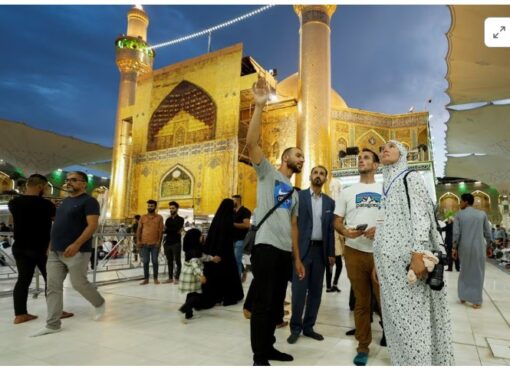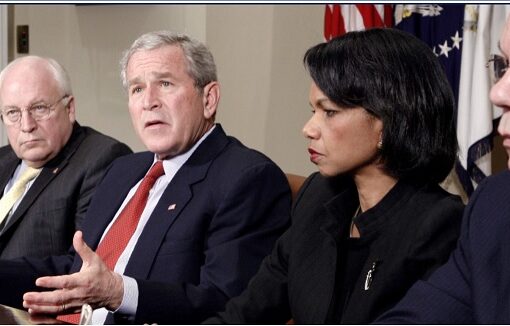The Iraqi government’s vociferous condemnations of U.S. defensive strikes may just be rhetorical, but they highlight the stakes involved for a country veering ever closer to perpetual Iranian dominance.
Eleven attacks and numerous warnings later, the United States has finally retaliated militarily against the Iranian-backed Shia militia Kataib Hezbollah. On December 29, American warplanes bombed five KH bases in Iraq and Syria, killing twenty-five of the group’s members and injuring fifty. The raid came two days after KH forces fired thirty rockets at the K-1 military base in Iraq, killing one U.S. contractor and injuring several Iraqi and American personnel.
In response to the U.S. strike, members and supporters of the Popular Mobilization Forces (PMF)—the government militia network of which KH is formally a part—stormed the gates of the U.S. embassy compound in Baghdad on December 31. They were led by key Iraqi officials such as National Security Advisor Faleh al-Fayyad and Hadi al-Ameri, head of the Iranian-backed Badr Organization.
All of this escalation is to the detriment of Iraq, whose government’s inaction is to blame for the violence. The embassy attack and ongoing U.S. response should force a moment of clarity for Iraqi leaders as they make a stark choice about the country’s future: namely, will they opt for international isolation akin to Iran’s, or for the type of sovereign, functional state that Iraqi protestors have been asking and dying for since October 1? Washington faces its own quandary—although military action against KH was necessary to deter Tehran and its proxies, carrying out such escalation without taking other necessary policy measures could give pro-Iran militias and Iraqi political elites an excuse to keep delaying the crucial reforms called for by demonstrators in dozens of cities.
IRAQ’S SELECTIVE SOVEREIGNTY
The U.S. air raid was the first such operation against Iraqi targets since 2011, but the country’s leadership was nevertheless quick to condemn it—even while remaining mostly silent about the killing and injuring of U.S. personnel that necessitated the move in the first place. After KH leader Abu Mahdi al-Muhandis threatened the United States with retaliation, the Iraqi government’s office of the commander in chief and National Security Council both issued scathing statements against the operation and threatened to review the entire U.S. military presence. President Barham Salih and speaker of parliament Mohammed al-Halbousi denounced the airstrikes as well, though their measured statements also reiterated the importance of protecting diplomatic outposts and exerting state control over all armed groups in order to avoid such U.S. reactions. Similarly, Shia leader Ayatollah Ali al-Sistani echoed the chorus of condemnation but pointed out that the U.S. strike was a “response to illegal activities by some groups.”
The most ubiquitous word in these and other statements was “sovereignty,” but Baghdad’s own track record made it impossible for Washington to respect Iraqi national sovereignty in this case. Although Defense Secretary Mark Esper did not ask for Baghdad’s permission before ordering the airstrikes, he did give Prime Minister Adil Abdulmahdi advance warning of the raid. Moreover, a Pentagon statement described the operation as defensive, and Special Representative for Iran Brian Hook noted that the strikes were ordered after pro-Iranian militias attacked U.S. positions in Iraq eleven times in the past two months alone. Previously, Secretary of State Mike Pompeo and other officials had pressed Baghdad over and over again to meet its obligation of protecting the U.S. military advisors tasked with training the Iraqi security forces. When the repeated proxy attacks finally drew American blood last week, Washington took matters into its own hands.
The resultant uproar exposes a troublesome trend that could wind up tearing the state apart: both the Iraqi government and out-of-control militias like KH are selective about when they respect and apply the principle of national sovereignty. The strident anti-American rhetoric issued over the past twenty-four hours is difficult to take seriously given the government’s deafening, months-long silence over militias attacking Iraqi military bases, the Baghdad international zone, and Saudi oil pipelines. Likewise, no Iraqi official has bothered to refute reports that Iranian military commander Qasem Soleimani personally led the crackdown on Iraqi protestors, with more than 500 killed, 20,000 injured, and many kidnapped since October 1.
Pro-Iran militias are similarly selective about exerting their Iraqi identity. After their associated political parties won seats in the 2018 parliamentary elections, many such militias resisted accountability to the state under the pretext that they were part of a larger “Islamic resistance” movement, as Asaib Ahl al-Haq leader Qais al-Khazali put it. Following the U.S. strikes on its bases, however, KH and its sister groups are now insisting that they are members of the PMF and thus under the Iraqi military’s jurisdiction. KH wants to have it both ways—acting independently from the state when suitable, then invoking Iraqi sovereignty when in need of protection. In this sense, fomenting anti-American protests at the embassy is a safer alternative for KH than firing rockets. In addition to lessening the risk of U.S. retaliatory strikes, such a shift may help KH and similar actors change their image from perpetrators to victims, essentially casting themselves as a righteously angry popular movement on par with the reformist protestors in Tahrir Square.
Iraq’s political leaders have seemingly fallen into KH’s rhetorical trap, denouncing the U.S. strikes as an attack on the PMF rather than a rogue element that serves a violent Iranian agenda. Compared to their silence after militia attacks killed Iraqi security personnel, their show of sympathy to KH seems like a fearful nod to Tehran and the leverage it exercises among Iraq’s political elite. It is also a shameful contrast to the protest movement’s vocal criticism of the militias, whose destructive adventurism on behalf of Iran has scared off foreign investment and attracted retaliatory attacks.
The response from Baghdad is not entirely bleak, though. As mentioned above, if statements by President Salih and Ayatollah Sistani are read with appropriate nuance, they put the blame for the recent escalation squarely on unruly militias and the state’s persistent weakness. Moreover, issuing strident condemnations of the airstrikes could give more rational Iraqi actors some political breathing room, enabling them to ride out the current wave of anti-American anger without caving in to Iranian and proxy calls for the departure of U.S. troops.
SUPPORT REFORMISTS AND DEESCALATE
The national protest movement that began in earnest this October may be the strongest available lever for making the Iraqi government more accountable on the militia issue and other matters of importance to the United States. The ongoing demonstrations in Baghdad and southern Iraq have already helped limit militia and Iranian influence in certain areas, turning the incentive structure in favor of Iraqi nationalists. With nods from Sistani and President Salih, the protests forced the prime minister’s resignation and reengineered the electoral system. In the south, it is now rare to see a flag representing militias or their parties. In comparison, the march on the U.S. embassy is a relatively small affair meant to distract from the larger protests in Tahrir Square and other locales.
Even so, Abdulmahdi has stayed on as the caretaker prime minister, and the longer he plays that role, the easier it is for militias to place their loyalists in positions of power. Last week, for example, he appointed senior KH figure Abu Muntadher al-Husseini to the post responsible for security of the Green Zone. Once charged with this important duty, Husseini promptly allowed rioters into the embassy compound.
Should Iran and its militias choose to escalate into a full-blown proxy war on Iraqi soil, they would further undermine the chances of serious reform while gaining further sway over the government. Washington should diligently deny Iran that leverage, while keeping the onus on Iraqi officials to protect U.S. military and diplomatic personnel—their only sure way to avoid future American retaliatory attacks.
More broadly, U.S. officials should recognize the limitations of pursuing local policies that are more focused on countering Iran than helping Iraq, since this approach ultimately facilitates Iranian influence. Instead, Washington should double down on its stated support for Iraqi protestors rallying against corruption and sectarian patronage. This entails maintaining pressure on formal and informal Iraqi institutions to protect human rights and preserve citizens’ ability to protest. Toward that end, the U.S. government should signal additional Magnitsky Act sanctions on upper echelons of the political class, as well as continue its support for political and economic reform in coordination with the EU and the UN Assistance Mission for Iraq (UNAMI). If suppressive efforts inside Iraq continue, Washington should find creative ways to help reformers make their voices better heard.
Finally, if Iranian pressure or sheer emotion spur Baghdad to call for an end to the U.S. military training mission, Washington should clearly communicate to Iraqi citizens and decisionmakers how such a move could put their security and economy in danger. Iraq still needs U.S. security assistance to stave off the resurgent Islamic State. Moreover, Iraq’s power needs are currently being met by Iranian natural gas, which it cannot buy without U.S. sanctions waivers. Perhaps most important, the country’s financial stability hinges upon oil sale revenues that are protected by the Federal Reserve Bank of New York. All of these interests are clear to many Iraqi leaders, who would be willing to stand up against Iranian pressure in order to protect them—especially since other countries would likely follow suit if the United States downgraded its diplomatic relations. Although Iraqi officials have taken legal and political pains to keep their anti-Americanism in the realm of mere rhetoric in recent years, that may no longer be enough now that American blood has been shed. At the same time, some Iraqi leaders remain wary of the inconsistencies in U.S. policy as seen next door in Syria, so Washington should take care to avoid making promises (or threats) it is unwilling to fulfill.
Bilal Wahab is the Wagner Fellow at The Washington Institute.
Source: The Washington Institute for Middle East Policy, December 31, 2020








Comment here